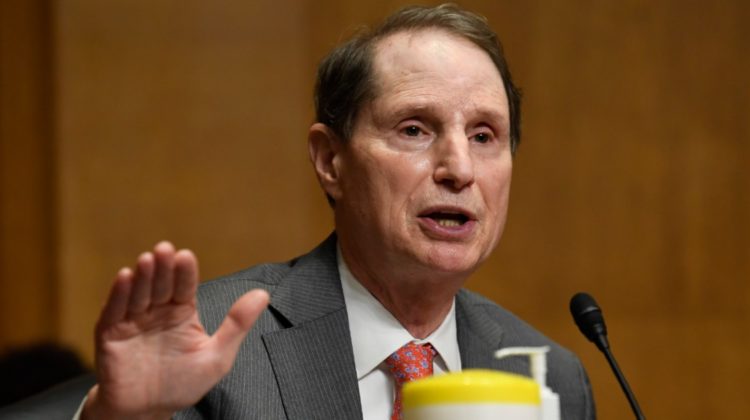
Senate Finance Committee Chairman Ron Wyden said on Thursday he is revisiting proposed legislation that would crack down on the giant tax-free retirement accounts amassed by the ultrawealthy after a ProPublica story exposed that billionaires were shielding fortunes inside them.
“I feel very strongly that the IRA was designed to provide retirement security to working people and their families, and not be yet another tax dodge that allows mega millionaires and billionaires to avoid paying taxes,” Wyden said in an interview.
ProPublica reported Thursday that the Roth IRA, a retirement vehicle originally intended to spur middle-class savings, was being hijacked by the ultrawealthy and used to create giant onshore tax shelters. Tax records obtained by ProPublica revealed that Peter Thiel, a co-founder of PayPal and an investor in Facebook, had a Roth IRA worth $5 billion as of 2019. Under the rules for the accounts, if he waits till he turns 59 and a half, he can withdraw money from the account tax-free.
The story is part of ProPublica’s ongoing series on how the country’s richest citizens sidestep the nation’s income tax system.
ProPublica has obtained a trove of IRS tax return data on thousands of
the wealthiest people in the U.S., covering more than 15 years. The
records have allowed ProPublica to begin, this month, an unprecedented
exploration of the tax-avoidance strategies available to the
ultrawealthy, allowing them to avoid taxes in ways most Americans can’t.
Wyden said ProPublica’s
stories have shifted the debate about taxes at the grassroots level,
underscoring a “double standard” that would have a nurse in Medford,
Oregon, dutifully paying taxes “with every single paycheck” while the
wealthiest Americans “just defer, defer, defer paying their taxes almost
until perpetuity.”
Wyden said, “Now, the
American people are with us on the proposition that everybody ought to
pay their fair share, and in that sense, the debate about taxes has
really changed a lot.”
The focus on recouping lost
tax revenue comes at a critical time, Wyden and others say, as
lawmakers look for ways to fund President Joe Biden’s infrastructure
plan and other domestic spending.
Wyden had worried for years
that Roth IRAs were being abused by the ultrawealthy. In 2016, he put
forth a proposal that would have reined in the amount of money that
could be stowed inside them.
“If I had my way back in
2016, my bill would have passed, there would have been a crackdown on
these massive Roth IRA accounts built on assets from sweetheart deals,”
Wyden said.
The proposal
was known as the Retirement Improvements and Savings Enhancements Act.
It would have required owners of Roth accounts worth more than $5
million to take out money over time, capping the accounts’ growth. It
also would have slammed shut a back door that allowed the wealthy to
move fortunes into Roths from less favorable retirement accounts. This
maneuver, known as a conversion, allows a taxpayer to transform a
traditional IRA into a Roth after paying a one-time tax.
Ted Weschler, a deputy of
Warren Buffett at Berkshire Hathaway, told ProPublica he supported
reforms to rein in giant Roth IRAs like his. Weschler’s account hit the
$264.4 million mark in 2018 after he converted a whopping $130 million
and paid a one-time tax years earlier, according to tax records obtained
by ProPublica.
In a statement to ProPublica earlier this week, Weschler didn’t address any specific reform plan but said:
“Although I have been an enormous beneficiary of the IRA mechanism, I
personally do not feel the tax shield afforded me by my IRA is
necessarily good tax policy. To this end, I am openly supportive of
modifying the benefit afforded to retirement accounts once they exceed a
certain threshold.”
Wyden’s proposal also
targeted the stuffing of undervalued assets into Roths, which
congressional investigators had flagged as the foundation of many large
accounts. Under the Wyden draft bill, purchasing an asset for less than
fair market value would strip the tax benefits from the entire IRA.
ProPublica’s investigation showed that Thiel purchased founder’s shares of the company that would become PayPal at $0.001 per share in 1999. At that price, he was able to buy 1.7 million shares and still fall below the $2,000 maximum contribution limit Congress had set at the time for Roth IRAs. PayPal later disclosed in an SEC filing that those shares, and others issued that year, were sold at “below fair value.”
A spokesperson for Thiel accepted detailed questions on Thiel’s behalf last week, then never responded to phone calls or emails.
The RISE Act was never
introduced because, Wyden said, Republicans controlled the Senate at the
time and made clear they opposed the effort. The proposal was also
heartily opposed by promoters of nontraditional retirement investments.
One of them wrote, at the time: “Everything about the RISE Act Proposal is opposed to capitalism and economic freedom.”
Following ProPublica’s
story on Roths, Sen. Elizabeth Warren, D-Mass., said the way to address
the gargantuan accounts would be a wealth tax, which would impose an
annual levy on households with a net worth over $50 million.
Warren tweeted
a link to the story and wrote: “Yes, our tax system is rigged with
loopholes and tax shelters for billionaires like Peter Thiel. And
stories like this will keep popping up until we pass a simple #WealthTax
on assets over $50 million to make these guys pay their fair share.”
Daniel Hemel, a tax law
professor at the University of Chicago who has been researching large
Roths, said that Congress should simply prohibit IRAs from purchasing
assets that are not bought and sold on the public market.
“There’s no reason people should be able to be gambling their retirement assets on pre-IPO stocks,” Hemel said.
He added that lawmakers
should go beyond reforms targeting the accounts directly and address a
potential estate tax dodge related to Roths.
If the holder of a large
Roth dies, the retirement account is considered part of the taxable
estate, and a significant tax is due. But, Hemel said, there’s nothing
to stop an American who has amassed a giant Roth from renouncing their
citizenship and moving abroad to a country with no estate taxes. It’s
rare, but not unheard of, for the ultrawealthy to renounce their U.S. citizenship to avoid taxes.
Under federal law, U.S.
citizens who renounce their citizenship are taxed that day on assets
that have risen in value but are not yet sold. But there’s an exception
for certain kinds of assets, Hemel said, including Roth retirement
accounts.
Thiel acquired citizenship
in New Zealand in 2011. Unlike the United States, New Zealand has no
estate tax. It’s not clear whether estate taxes figured into Thiel’s
decision.
A spokesperson for Thiel
did not immediately respond to questions on Friday about whether estate
taxes factored into Thiel’s decision to become a New Zealand citizen.
In his application for
citizenship, Thiel wrote to a government minister: “I have long admired
the people, culture, business environment and government of New Zealand,
as well as the encouragement which is given to investment, business and
trade in New Zealand.”
Patching the hole in the
expatriation law, Hemel said, “should be a top policy priority because
we’re talking about, with Thiel alone, billions of dollars of taxes.”

